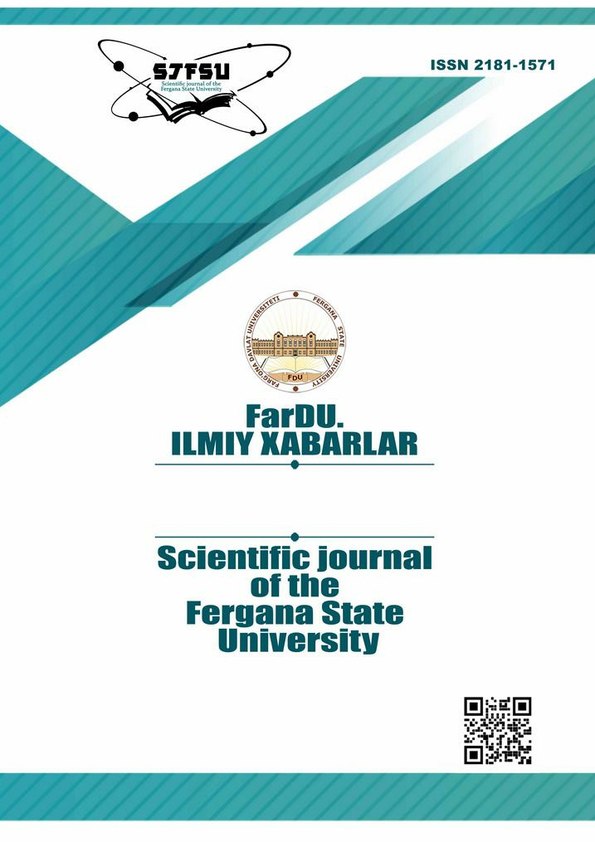WORD ORDER IN IMPERATIVE CONSTRUCTIONS
Keywords:
advertising text, advertising language, imperative, inversion, reduplication, pragmalinguisticsAbstract
This article is written with the purpose of the scientific disclosure of the methods, mechanisms and laws of the sentences in Uzbek language with imperative meaning, that is, persuasion, encouragement, convincing, which dominates the content of advertising. For this purpose, methods such as description, classification, associative, component and contextual analysis, structural-functional analysis have been used. As a result, the inversion is considered to be one of the most acceptable ways to increase the methodological color of the content of the message, to change it from the declarative to the emotional state, and its place in advertising texts in the nature of the Uzbek language. That is, the issue of the word order is also explained in detail, revealing the methods, mechanisms and laws of the Uzbek expression of the meaning of imperative, persuasion, encouragement, persuasion in the Uzbek language.The end of the article is characterized by presenting the fact that due to their concise and incomplete form, the elliptical constructions expressing author's propaganda in advertising texts attract more attention than complete, complex sentences. Cohesive means (elliptical syntax, syntactic parallelism, lexical-grammatical repetitions) reduce the effectiveness of the semantic lacuna by restoring the transaction. It concludes that those means has the illocutive power of focusing person’s thought into a linguistic environment of another language, and also allows the recipient to achieve the effect of "partnering" in the interpretation of the text..
References
Asqarova Sh. Ingliz va o‘zbek tillarida takror ifoda usulining xususiyatlari // Buxoro davlat universiteti ilmiy axboroti, 2020/1 (77). (Askarova Sh. Features of repetition in English and Uzbek // Bukhara State University)
Балли Ш. Стилистика французского языка. – М.: Наука, 1979. (Balli Sh. Fransuz tili stilistikasi. - M.: Nauka)
Boboyeva A. Hozirgi o‘zbek adabiy tilida to‘liqsiz gaplar. – Toshkent, 1978. (Boboyeva A. Incomplete sentences in modern Uzbek literary language)
Boboyeva A. To‘liqsiz gapning to‘liqligi // O‘zbek tili va adabiѐti, 1967. (Boboyeva A. Completeness of incomplete sentences // Uzbek language and literature)
Bozorov O. O‘zbek tilida gapning kommunikativ (aktual) tuzilishi: filol. fan. nomz. ...dis. – Farg‘ona, 2004. (Bozorov O. Communicative (actual) structure of speech in Uzbek language)
Borovkov A., Ma’rufov Z., Abdullayev Y. va b. O‘zbek tili darsligi. II qism. Sintaksis. – Toshkent: O‘rta va oliy maktab davlat nashriѐti, 1962. (Borovkov A., Marufov Z., Abdullayev Y. and others. Uzbek language textbook State Publishing House of Secondary and Higher Education)
Hozirgi zamon o‘zbek tilshunosligi. Sintaksis. – Toshkent, 1961. (Modern Uzbek linguistics. Syntax)
O‘zbek tili grammatikasi. II tom. – Toshkent: 1976. (Uzbek grammar)
Qurbonova M. Hozirgi zamon o‘zbek tili. Sodda gap sintaksisi uchun materiallar. – Toshkent: Universitet nashriѐti, 2001. (Kurbanova M. Modern Uzbek language. Materials for simple sentence syntax)
Sayfullayeva R. va b. Hozirgi o‘zbek adabiy tili. – Toshkent: Mumtoz so‘z. 2010. (Sayfullayeva R. and b. Modern Uzbek literary language. - Tashkent: A classic word)
Ziyayev A. Ingliz tilida so‘z ma’nolarini kuchaytirishning lingvokognitiv aspekti. Filol. fan. nomz. diss... avtoref. – T., 2009. (Ziyaev A. Linguocognitive aspect of word reinforcement in English)
Iminov M., No‘monov T., Boboxonova D. O‘zbek tili uslubiyati masalalari. – Namangan:”Namangan” nashriѐti, 2007. (Iminov M., Numanov T., Bobokhonova D. Problems of Uzbek language methodology)
Локман Б. Структура и семантика редупликации в турецком и таджикском языках: дисс. … канд. филол. наук. – Душанбе, 2015. (Lo‘qmon B. Turk va tojik tillarida ikkilanishning tuzilishi va semantikasi)
Nurmonov A. va boshqalar. O‘zbek tilining mazmuniy sintaksisi. – Toshkent: Fan, 1992.. (Nurmonov A. and others. Semantic syntax of Uzbek language)
Sa’dullayeva N.A. O‘zbek tilshunosigida to‘liqsiz gaplar // Buxoro davlat universiteti ilmiy axboroti. 2020/1 (77) (Sa’dullayeva N.A. Incomplete sentences in Uzbek linguistics Bukhara State University Scientific Information)
Соколова О. В. Типология дискурсов активного воздействия: поэтический авангард, реклама и PR. ‒ М.: Гнозис, 2014. 2-е изд. (Sokolova O. V. Faol ta'sir ko'rsatadigan nutqlarning tipologiyasi: she'riy avangard, reklama va PR Gnosis)
Downloads
Published
Issue
Section
License

This work is licensed under a Creative Commons Attribution-NonCommercial-NoDerivatives 4.0 International License.

